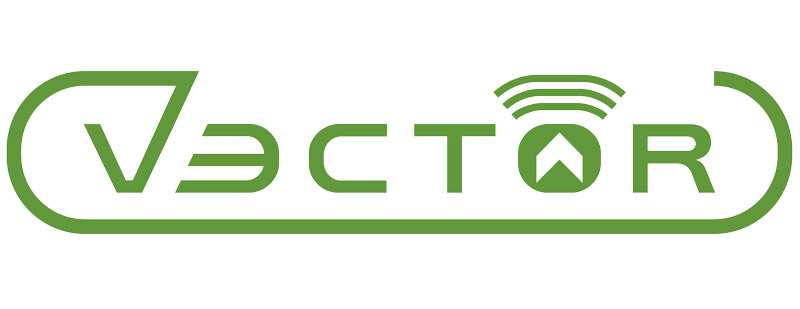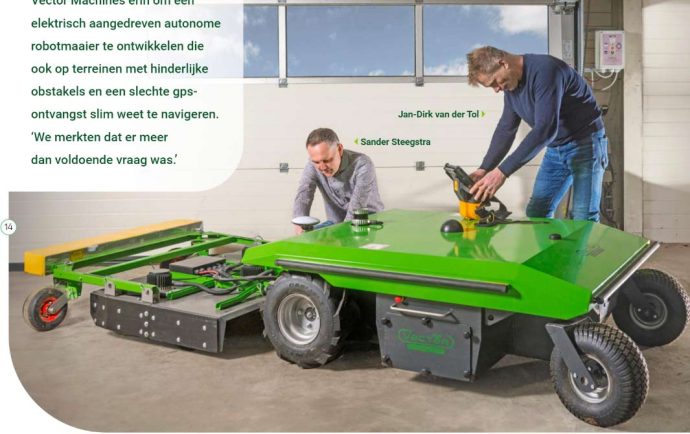The interview below was written by Folkert van der Glas on behalf of the Northern Development Company (NV NOM) and can be read in edition 48 of the NOMMER. The photo was taken by Hans van Dijk on behalf of NV NOM.
Vector Machines introduces revolutionary robotic lawnmower
It was not an easy task. That was especially clear. Nevertheless, Vector Machines managed to develop an electrically powered autonomous robotic lawnmower that can also navigate intelligently in areas with annoying obstacles and poor GPS reception. 'We noticed that there was more than enough demand.'
"If we had twenty machines ready, they would have been gone yesterday," says Erik Post. 'The interest from the market is great. Not surprising, when you consider how many solar parks there are and are being built worldwide and how enormous the areas to be mowed are. The traditional way of lawn maintenance is then quite a challenge and often even impossible.'
Erik is responsible for marketing and export at Vector Machines. The company, which formally started in 2022 and operates from Lemmer and Stiens, developed its own autonomous robotic lawnmower. Nothing new in itself of course. Autonomous mowers can be found everywhere these days. On sports fields or at people's homes to keep the lawn neat and healthy. Only: common robotic lawnmowers work with GPS. And yes, it is sometimes difficult to mow at solar parks. After all, there is no longer GPS reception under the panels. Vector Machines offers a solution for exactly this. Through a combination of technologies, the Vector WD2.0, as the machine is called, is able to meticulously scan the terrain and adapt the mowing movements to the environment.
Agricultural technician
Vector Machines was founded by Jan-Dirk van der Tol and Sander Steegstra. Jan-Dirk, an agricultural technician, focused his company Machines4Green for years on the sale of radio mowing machines for, among other things, lawn maintenance in and around solar parks. With another company, called Feedtuber, he was involved in the sale and production of technical systems for ensiling livestock feed and crushing and compressing biomass. Sander was once owner of the sales and service platform Cvtotaal. He sold the company, with which he offered central heating systems, heat pumps and solar panels, among other things, to a major energy giant in 2018.
Sports fields and golf courses
The then Flinc, until recently a NOM label and now “simply” bears the name of the development company, saw Sander as a possible investor in promising northern companies. It was also through Flinc that Jan-Dirk and Sander first met. "I was linked to Jan Dirk because he was looking for an investor for Feedtuber," says Sander. 'Shortly before, I had started Ergon Robots, a dealer of autonomous mowing robots for large areas such as sports fields and golf courses. The energy company to which I sold Cvtotaal was active in solar parks and asked whether my robots were also suitable for that. No, I had to admit. But I did see opportunities, especially after I heard that Jan-Dirk was already quite familiar with this with Machines4Green. So the conversations soon turned not only about Feedtuber, but increasingly about mowing solar parks. We clicked, partly because of our shared interest.'
merger
There was also surprise. About how fuel-driven machines were still often used on sustainable energy projects such as solar parks. That there was little or no autonomous mowing and, above all, that there was no adequate solution yet for the smooth mowing of large, rough areas with obstacles and unevenness everywhere. "We soon discovered that there was a valid reason for this," Sander smiles. 'It was just very difficult. Still, we decided to take up the challenge and join forces. This is how Vector Machines was created, from a merger between Machines4Green and Ergon Robots.'
Lidar
The activities of both companies were transferred to the new company, but the focus was mainly on the development of what would later be called the Vector WD2.0. A complex job, as mentioned. 'It is relatively easy to start a mowing route at solar parks using GPS-RTK, a technology for extremely accurate navigation, and satellites,' Sander argues. 'But yes, once the robot is under the panels, contact is lost.'
To tackle that problem, the Vector Machines mower is equipped with lidar technology. Lidar stands for light detection and ranging. Or in good Dutch: determining the location by means of laser pulses. It enables the machine to accurately identify and avoid obstacles. Sensors are also used, for example, to monitor the wheel speed and to ensure that the robotic lawnmower can maneuver independently under all circumstances. It is mainly the combination of GPS-RTK and lidar that makes the Vector WD2.0 unique and distinctive," Sander emphasizes. "That had never been done before."
Working capital
Once a working prototype was ready, it was time to call in the NOM. Financing was needed to hire professionals. At the same time, there was a need for working capital to bear the short-term costs. "Of course, we noticed that there was more than enough demand," says Sander. 'But the machines had to be built first. Of course, we only get paid if we can actually deliver.'
The NOM was impressed. Just like the Rabobank. Together they provided Vector Machines with the desired financing. "The market potential is clearly present," says Daniëlle van Dalfsen, Investment Manager at NOM. 'Jan-Dirk and Sander are also a perfect combination. Sander has a creative and innovative mindset and Jan Dirk is truly a practical man who knows exactly what a machine needs in terms of technology. Moreover, the phase the company was in fits perfectly with NOM.'
Tool carrier
The first machines have now been sold in the Netherlands. Vector Machines also expects to enter the foreign market this year. Expectations are high. "We knew that the market in the Netherlands was already very large," Erik explains. 'As we visited more international trade fairs, we saw that there was demand everywhere for a product like the Vector WD2.0. Not only in Europe, but also far beyond.'
The Vector WD2.0 is more than just an electrically powered and autonomous robotic lawnmower, says Erik. 'It is a so-called tool carrier. A machine on which you can hang different tools. You can also equip it with, for example, a hoe or a cylinder mower. This means that the machine can be applied much more broadly than just to solar parks. Think of golf courses, tree nurseries or fruit growing. In fact, wherever GPS reception is sometimes poor and obstacles make green maintenance difficult, the Vector WD2.0 quickly becomes interesting.'

